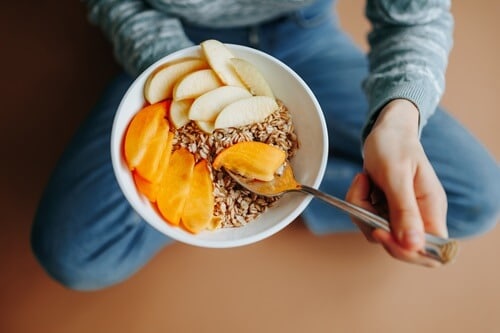Mindfulness can help your mental health, sleep schedule, and work life. But, it’s quite a complex concept. Aside from being in the moment and being open to your thoughts, it can be hard to apply mindfulness in daily life. This is why a morning mindfulness routine can set you up for success every day.
Incorporating the tenets of mindfulness into your morning will improve your mental clarity and productivity. In this article, we’ll explore mindful activities that you can do after waking up. Most importantly, we’ll give you some ideas for an unbeatable morning mindfulness routine to seize the day.

What are the Pillars of Mindfulness Morning?
To help you choose the best activities for a morning mindfulness routine, let’s take a closer look at mindfulness. In his book “Full Catastrophe Living”, author Jon Kambat Zinn explains that there are 7 core mindfulness principles. These are:
- Non-judging – As a mindful individual, try not to judge yourself if you get distracted or leave the present moment.
- Patience – Mindfulness acknowledges that everything happens in its own time. Furthermore, you can’t rush or force things to happen.
- Beginner’s Mind – When you approach a task or situation, don’t let memories and opinions influence you. Instead, think about everything as if you are seeing/doing it for the first time.
- Trust – Don’t be afraid to trust yourself and your mind. Remember, you know what you are doing.
- Non-striving – It’s good to have goals, but not if they take up too much of your focus. After all, mindfulness isn’t about being in the future. It’s about being in the present
- Acceptance – If you’re always focusing on what needs to change, nothing will ever be good enough. Try to accept and experience everything.
- Letting Go – Your mind will often hold onto things that do not serve you. While you don’t need to try and forget things, accept that that’s how your mind works.
These principles are the foundation of mindful activities. In turn, your morning mindfulness routine should prepare you to apply them during your day.

How Does a Morning Mindfulness Routine Lead to Success?
Now you know what a morning mindfulness routine is trying to achieve, we’ll explore the benefits it can bring.
1.Consistency
Engaging in a morning mindfulness routine every day means mindful activities will become habits. Habit formation and consistency can help you form habits in other areas of your life. As a result of a routine, if you tend to forgo important parts of your morning like exercise or brushing your teeth, you’ll find them easier.

2.Emotional Balance
Studies have shown that mindfulness can improve your self-awareness. With this, you’ll avoid overthinking and will be able to let go of distracting thoughts. Similarly, if you practice mindfulness in the morning, the resulting emotional balance can help you avoid stress throughout the day.

3.Quality Sleep
Most people hate waking up in the mornings. According to Statista, a third of Americans feel their sleep is “fair or poor”, leading to tiredness throughout the day. Practicing mindfulness can help reduce stress and unhealthy thought patterns that lead to bad sleep. Moreover, a mindful morning routine will set you up for the day and for the next night.
4.Enhanced Focus
With the above in mind, feeling well-rested when you wake up can help to improve your focus. Mindfulness has also been proven to raise productivity. This means you can complete tasks quickly and with ease. Leading on from this, when it feels easier to work, you’ll be more motivated.

5.Improved Creativity
As well as helping you stay calm in stressful situations, a mindfulness morning routine will help you problem solve. Again, when you notice you can be more creative, you’ll be more willing to get stuck in and tackle challenges throughout the day.
Your New Morning Mindfulness Routine
Finally, it’s time to share some ideas for your mindfulness morning routine.
1. Begin the Night Before

Though a morning mindfulness routine can assist you with mindful practices, this mindset doesn’t have a time-limit. To ensure you get the most out of your mornings, it’s best to set yourself up for success the night before.
Raphael Vallat of the Center for Human Sleep Science at U.C. Berkeley, explained that “The higher the amount of physical activity, the more awake and alert you feel the next day.”
So, you can exercise before bed, prepare your things so you aren’t rushing in the morning, or engage in progressive muscle relaxation (PMR). This will help you strengthen the link between your mind and your body, and improve your sleep.
2. Rise Early
You should try to wake up early. This way, you’ll feel the benefits of enhanced focus and increased motivation. In fact, it’s been proven that people who wake up early are more likely to be proactive than those who stay up late. Not to mention, you’ll have enough time to complete your morning mindfulness routine without stress.
To add to this, waking up early reinforces patience, acknowledging that mindfulness can sometimes take time. Rising early will give you a fresh perspective on the day, and allow you to live in the present moment rather than thinking about the day’s to-do list.

3. Take Time For Yourself
There are just so many things we need to do in the morning. Sometimes, it’s not surprising that it can all get to be too much for us. To avoid this situation, it’s best to take a few minutes and find calm. Remember, mindfulness is all about being present in every moment, so enjoy the morning.
One of the main mindful practices is meditation, and this fits in well with a relaxed morning routine. Meditation allows you to practice the 7 principles of mindfulness during your mornings. However, there’s much more to being mindful than sitting and allowing your thoughts to flow. If you struggle to meditate, you could journal, take a walk outside, or do some yoga.
4. Reach for a Book, Not Your Phone
Looking at your phone takes your thoughts away from the present moment. It doesn’t matter if it’s a text from your mom about getting a coffee together or the day’s news. To help you remain in the present moment, practice patience, nourish your mind, and be non-striving. Likewise, a good book from which you can learn something new is a great help.

5. Make a Healthy Breakfast
Did you know that almost a quarter of Americans skip breakfast? On the other hand, people who eat breakfast often make something without thinking about their body. It’s worth taking a few minutes to find something your body wants and your mind enjoys.
Breakfast is all about getting enough energy to feel happy, productive and focused all day long. Therefore, remember to be non-judging of your thoughts and feelings about food. Overall, practicing mindful eating can make enjoying breakfast much easier.
In Conclusion
A mindfulness morning routine will leave you feeling well-rested, focused and prepared to tackle anything the day may throw at you.
Don’t be hard on yourself if you feel like spending a few extra minutes in bed, or accidentally forget to check something off your routine’s list. Instead, allow yourself to do what’s best for you.
Remember, these are simply some ideas for your mindfulness morning routine. If you want to change them up, or add things in, go for it!
Now it’s Your Turn: Is your morning routine mindful? Let us know how you like to start the day in a mindful way below…
References
Books
Kabat-Zinn, J. (2013) Full catastrophe living: Using the wisdom of your body and mind to face stress, pain, and illness. New York: Bantam Books Trade Paperbacks.
Journals
Behan, C. (2020) ‘The benefits of meditation and mindfulness practices during times of crisis such as covid-19’, Irish Journal of Psychological Medicine, 37(4), pp. 256–258. doi:10.1017/ipm.2020.38.
Buckner, S.L., Loprinzi, P.D. and Loenneke, J.P. (2016) Why don’t more people eat breakfast? A biological perspective, The American journal of clinical nutrition. Available at: https://www.ncbi.nlm.nih.gov/pmc/articles/PMC4881002/ (Accessed: 01 December 2023).
Coo, C. and Salanova, M. (2017) ‘Mindfulness can make you happy-and-productive: A mindfulness controlled trial and its effects on happiness, work engagement and performance’, Journal of Happiness Studies, 19(6), pp. 1691–1711. doi:10.1007/s10902-017-9892-8.
Davis, D.M. and Hayes, J.A. (2011) ‘What are the benefits of mindfulness? A practice review of psychotherapy-related research.’, Psychotherapy, 48(2), pp. 198–208. doi:10.1037/a0022062.
Gardner, B., Lally, P. and Wardle, J. (2012) ‘Making health habitual: The psychology of “habit-formation” and general practice’, British Journal of General Practice, 62(605), pp. 664–666. doi:10.3399/bjgp12x659466.
Hughes, Z. et al. (2023) ‘A meta-analytical review of the impact of mindfulness on Creativity: Framing current lines of research and defining moderator variables’, Psychonomic Bulletin & Review [Preprint]. doi:10.3758/s13423-023-02327-w.
Randler, C. (2009) ‘Proactive people are morning people1’, Journal of Applied Social Psychology, 39(12), pp. 2787–2797. doi:10.1111/j.1559-1816.2009.00549.x.
Shallcross, A.J. et al. (2019) ‘Waking up to the problem of sleep: Can mindfulness help? A review of theory and evidence for the effects of mindfulness for sleep’, Current Opinion in Psychology, 28, pp. 37–41. doi:10.1016/j.copsyc.2018.10.005.
Websites
Mindful eating (2023) The Nutrition Source. Available at: https://www.hsph.harvard.edu/nutritionsource/mindful-eating/ (Accessed: 01 December 2023).
Elflein, J. (no date) Topic: Sleep in the U.S., Statista. Available at: https://www.statista.com/topics/2000/sleep-in-the-us/ (Accessed: 01 December 2023).
Iamreneeonque (2022) Use this ‘4-part prescription’ to wake up alert and refreshed every morning, CNBC. Available at: https://www.cnbc.com/2022/12/14/a-4-part-prescription-to-help-increase-alertness-after-waking-up.html (Accessed: 01 December 2023).







